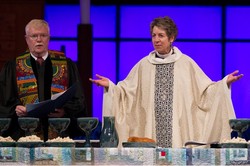For the past twelve years, The Episcopal Church and the Presbyterian Church (U.S.A.) have been engaged in bilateral dialogue as part of their participation in Churches Uniting in Christ. While still struggling to reach full reconciliation of their ordained ministries, the two churches did reach an agreement for PC(USA) teaching elders and Episcopal priests to administer Holy Communion in each other’s churches with special permission.
This agreement was approved by the 218th General Assembly (2008), (with ratification by the presbyteries in 2009) and the 76th General Convention of the Episcopal Church in 2009. The churches have continued in dialogue between 2010 and 2014. An interim report was presented to the 221st General Assembly (2014) authorizing a continuation of the dialogue through 2018. The continued dialogue will addresses issues related to expression of ordered ministries at the local level (congregation/diocese); continued embodiment of episcope (personal, collegial, corporate); the issue of “re-ordination”; migration from the “global south” and integration of different cultural traditions in existing churches; opportunities for shared theological education and formation for ministry; and how our ecumenical relationships help us address the demographic and cultural changes that are contributing to declining membership in both denominations. The next dialogue meeting will be held in November within the bounds of the Presbytery of Denver. Presbyterian representatives on the dialogue include Ruling Elder Anne Bond, Teaching Elder Christian Boyd, Teaching Elder Kamal Hassan, Teaching Elder Dennis Hughes, and Ruling Elder/Deacon Gordon Zerkel. Teaching Elder Robina Winbush, Associate Stated Clerk for Ecumenical Relations serves as staff to the dialogue team.
As part of our dialogue, we’ve had the opportunity to meet with several Episcopal Presbyterian congregations, whose lived ecumenical witness encouraged us to keep looking for a way forward. Feel free to check out the websites of Indian Hill Congregation in the Presbytery of Cincinnati; Wilton Presbyterian Church in the Presbytery of Southern New England and St. Matthews Episcopal Church in Wilton, Connecticut; and Trinity Church Park Rapids in Northern Waters Presbytery. If you live nearby, I’m sure they would appreciate a visit.
A subtle but significant moment during the 221st General Assembly (2014) occurred during the Ecumenical Service of Worship on Wednesday, July 18th. The Stated Clerk of the General Assembly, the Reverend Gradye Parsons, and the Presiding Bishop of the Episcopal Church, the Most Reverend Katharine Jefferts Schori, stood together at the Lord’s Table and led the congregation in receiving Holy Communion. The Eucharistic liturgy developed by Churches Uniting in Christ for local use provided the liturgical tool for the Stated Clerk of the General Assembly and the Presiding Bishop to share in administering Holy Communion. Much has historically divided our two traditions, however recent dialogues have opened the door for us to give visible witness to the unity we share in Jesus Christ.
While the hard work of dialogue and resolution of centuries of division is still necessary, we are reminded that we are nurtured for this work at the Lord’s Table and encouraged by the mission that is done jointly for the healing of our communities and to the glory of God.
Resources
- Download the report (PDF) from the bi-lateral dialogue.
- Download the communion liturgy (PDF) used at the Ecumenical Service of Worship at the General Assembly.
- Download the full worship service bulletin (PDF) for the Ecumenical Service of Worship.
Agreement Between The Episcopal Church and the Presbyterian Church (U.S.A.)
- We acknowledge one another’s churches as churches belonging to the one, holy, catholic, and apostolic Church.
- We acknowledge that in our churches the Word of God is authentically preached and the sacraments of Baptism and Eucharist are duly administered.
- We acknowledge one another’s ordained ministries as given by God and instruments of grace, and look forward to the time when the reconciliation of our churches makes possible the full interchangeability of ministers.
- We acknowledge that personal and collegial oversight (episcope) is embodied and exercised in our churches in a variety of forms, episcopal and non-episcopal, as a visible sign of the Church’s unity and continuity in apostolic life, mission, and ministry.
- We agree that authorized ministers of our churches may, subject to the regulations of the churches and within the limits of their competence,[1] carry out the tasks of their own office in congregations of the other churches when requested and approved by the diocesan bishop and local presbytery.
- We agree that The Episcopal Church will invite members of the Presbyterian Church (U.S.A.) to receive Holy Communion in their churches and the Presbyterian Church (U.S.A.) will invite members of The Episcopal Church to receive Holy Communion in their churches. We encourage the members of our churches to accept this Eucharistic hospitality and thus express their unity with each other in the one Body of Christ.
- We agree to continue to dialogue in the areas such as diaconal ministries, historic episcopate, the office of elder, etc. that would lead to full reconciliation of our ministries and interchangeability of our ministers.
- We encourage diocesan bishops and presbyteries to provide regular occasion for planning, discussing, resourcing for missional, educational, and liturgical life together. In addition, to explore possibilities for new church development and redevelopment together.
- We agree to develop a process to support and implement the above recommendations.[2]
- We affirm these proposals mark an important step in moving toward the full, visible unity of the Church. We know that beyond this commitment lies a move from the recognition to the reconciliation of churches and ministries within the wider fellowship of the universal Church.
[1] Because we do not yet have reconciliation and full interchangeability of ordained ministries, all authorization for these special opportunities must conform to the Book of Common Worship and the Book of Order of the Presbyterian Church (U.S.A.), and the Book of Common Prayer and the Constitution and Canons of The Episcopal Church.

